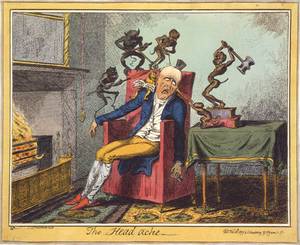| (Photo credit: Wikipedia) |
Do you suffer from migraine headaches?
Maybe you answered this question affirmatively. Or maybe you have a close relative or friend who suffers from migraine headaches. Experts suggest that the number of Americans that suffer from migraine headaches is somewhere between 12 and 16 percent of the total population. The U.S. National Library of Medicine places the number at 12%; while a study completed in 2009 by the Centers for Disease Control and Prevention (CDC) indicated about 16% of Americans suffer migraine headaches.
Again, if you suffer from migraine headaches then you know the signs and symptoms; additionally you are aware that the headache can last from 2 hours to 72+ hours. Wikipedia references studies that indicate:
- Migraines are a significant source of both medical costs and lost productivity.
- In the United States direct costs have been estimated at 17 billion dollars.
- One tenth of this cost is due to the cost of triptans (drugs used to treat migraines)
- Indirect cost are around 15 billion dollars, most resulting from missed work
New study examines migraine sufferers who also have depression
The results of a new study were published May 22, 2013, online in the journal Neurology, The Official Journal of the American Academy of Neurology: Migraine, depression, and brain volume. The objective of this research was: To examine the joint association of migraine headache and major depressive disorder on brain volume in older persons without dementia.
Study’s parameters…
The study was funded by the National Institutes of Health, the National Institute on Aging in the U.S., the Icelandic Heart Association and the Icelandic Parliament.
- Study included 4296 participants with 58% being women
- Participants were on average 51 years old when they were first tested for migraines between 1967 and 1991.
- Participants were reassessed using a depression test and an MRI brain scan between 2002 and 2006, with the average being 76.
Study’s findings…
According to a HealthDay article: “Compared to those with no history of migraines or depression, those with both conditions had brain volumes about 2 percent smaller. There was no difference in the total brain volume when comparing people with only one of the conditions to those with neither condition.”
Going forward…
As you can quickly determine by reading any of the related articles below, this research will initiate a lot of conversation about migraines, depression and brain volume. Even the lead author, Larus S. Gudmundsson, PhD. indicated that those with depression and migraines may not suffer brain shrinkage as it is possible their brain were smaller from birth.








